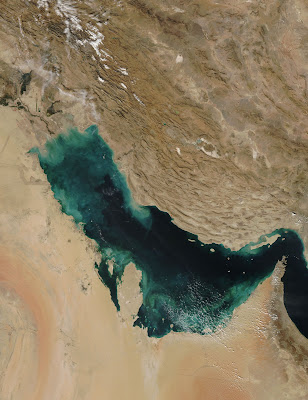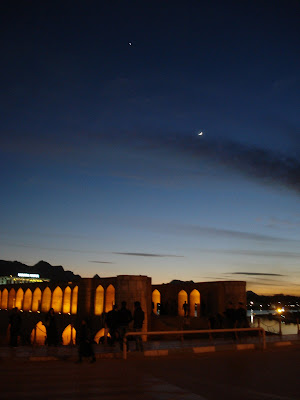Obstacles

The almost four-decade-old territorial dispute about the Persian Gulf islands Abu Musa and the Greater and Lesser Tunbs again culminated this week when the Secretary General of the Gulf Cooperation Council (GCC), Abdulrahman AlـAttiyah, compared Iran with Israel occupying Arab land, as Kuwait’s Al Watan reported on Thursday this week, quoting the pan-Arab newspaper Asharq Al Awsat.
The statement reveals, if not simply stupidity, exorbitance in arguments and the usual striking double standard of Arab leaders and authorities whenever dealing with US interests and issues regarding Israel.
Here are some facts about the islands. Greater (Tonb-e Bozorg) and Lesser Tunb (Tonb-e Kuchak) are two tiny islands about 20 km south of the larger Qeshm Island. The Greater Tunb (about 10 km2) might be inhabited by a few dozens of people. The Lesser Tunb (about 2 km2) is uninhabited. The islands are lying in the middle of the main sea lanes of the Persian Gulf making them strategically important.
As regards to Abu Musa, oil comes into play. The 12 km2 large island is located more centrally in the Persian Gulf and inhabited by several hundred people, Iranians and Arabs. The island harbors a rich supply of untapped oil deposits. Currently, oil is being extracted from a filed close to the shores of Abu Musa.
The UEA, in claiming these islands, which are close to the main sea lanes near the Strait of Hormuz, may indeed be under misapprehension. The issue has quite a long history and may be seen under different perspectives, much depending on how former allies of the US are seen today. Iran has more or less controlled Abu Musa since 1971 when Britain ended its protectorate of the region, which included also Bahrain and Qatar. When the small Emirate Sharjah signed an agreement with Iran accepting Iranian presence on the island with neither side yielding its claim of total sovereignty, Ras Al Khaymah refused and Iran occupied the Tunbs. The Iranian take-over was acquiesced by the US and Britain since the pro-western Shah-regime was considered more reliable in providing stability in a by and large uncertain region. Thus, the Shah’s control over traffic through the Strait of Hormuz was welcomed as the by far better solution.
In 1992, one year after Kuwait had been freed from Saddam Hussein’s occupation, the UAE claimed that Iran had annexed also Abu Musa and Arab inhabitants even expelled from the Island, a frank violation of the agreement with Sharjah. Iran never acknowledged that claim. In a series of military exercises in the Gulf Iran had also sent its message of not accepting any US hegemony in the region.
The again shrill tone by the Emiratis may well be seen as a prelude to new threats imposed on Iran. While the preparations for a naval blockade of the country (most probably in accordance with House Resolution 362) have been denied last week by Strategic Studies Think Tank (Stratfor) it might still be one option of the outgoing Bush Administration ‘on the table’. Tehran had, in the meantime, openly announced a possible closure of the Strait of Hormuz in order to protect its sovereignty.
The anew dispute about the Gulf islands may indicate how leaders of UAE are under pressure of the US. The possible obstruction of the world's most important lifeline is the main obstacle for a more diplomatic approach.
The statement reveals, if not simply stupidity, exorbitance in arguments and the usual striking double standard of Arab leaders and authorities whenever dealing with US interests and issues regarding Israel.
Here are some facts about the islands. Greater (Tonb-e Bozorg) and Lesser Tunb (Tonb-e Kuchak) are two tiny islands about 20 km south of the larger Qeshm Island. The Greater Tunb (about 10 km2) might be inhabited by a few dozens of people. The Lesser Tunb (about 2 km2) is uninhabited. The islands are lying in the middle of the main sea lanes of the Persian Gulf making them strategically important.
As regards to Abu Musa, oil comes into play. The 12 km2 large island is located more centrally in the Persian Gulf and inhabited by several hundred people, Iranians and Arabs. The island harbors a rich supply of untapped oil deposits. Currently, oil is being extracted from a filed close to the shores of Abu Musa.
The UEA, in claiming these islands, which are close to the main sea lanes near the Strait of Hormuz, may indeed be under misapprehension. The issue has quite a long history and may be seen under different perspectives, much depending on how former allies of the US are seen today. Iran has more or less controlled Abu Musa since 1971 when Britain ended its protectorate of the region, which included also Bahrain and Qatar. When the small Emirate Sharjah signed an agreement with Iran accepting Iranian presence on the island with neither side yielding its claim of total sovereignty, Ras Al Khaymah refused and Iran occupied the Tunbs. The Iranian take-over was acquiesced by the US and Britain since the pro-western Shah-regime was considered more reliable in providing stability in a by and large uncertain region. Thus, the Shah’s control over traffic through the Strait of Hormuz was welcomed as the by far better solution.
In 1992, one year after Kuwait had been freed from Saddam Hussein’s occupation, the UAE claimed that Iran had annexed also Abu Musa and Arab inhabitants even expelled from the Island, a frank violation of the agreement with Sharjah. Iran never acknowledged that claim. In a series of military exercises in the Gulf Iran had also sent its message of not accepting any US hegemony in the region.
The again shrill tone by the Emiratis may well be seen as a prelude to new threats imposed on Iran. While the preparations for a naval blockade of the country (most probably in accordance with House Resolution 362) have been denied last week by Strategic Studies Think Tank (Stratfor) it might still be one option of the outgoing Bush Administration ‘on the table’. Tehran had, in the meantime, openly announced a possible closure of the Strait of Hormuz in order to protect its sovereignty.
The anew dispute about the Gulf islands may indicate how leaders of UAE are under pressure of the US. The possible obstruction of the world's most important lifeline is the main obstacle for a more diplomatic approach.
First published at Freelance.



Comments